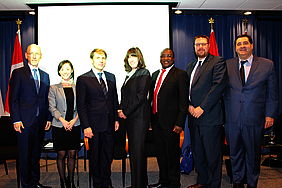On 15th November the IGTC held a high-impact seminar at the Canadian Embassy in Washington D.C, addressing the global need for grains and the challenges and opportunities of trade and investment.
D.C. based embassy officials, international organisations, and US government officials joined the active dialogue with grain industry thought and decision leaders.
The event coincided with the IGTC’s 2017 General Assembly, which welcomed experts and senior leadership from IGTC members and Corporate Stakeholders who work on the provision of food, feed and industrial products from grain.
Opening remarks were provided by Marvin Hildebrand, Minister (Economic), Embassy of Canada. Minister Hildebrand gave perspectives about Canada's leadership role in a number of global grain trade initiatives. The Minister also highlighted the importance of the grains sector to the Canadian economy, as well as global food security.
From the IGTC's side, grain industry experts from around the world provided perspectives and recommendations on how to improve the trade and investment environment tied to international movement grains, oilseeds and other agri-bulks.
The speakers were: Tyler Bjornson, President of Canada Grains Council; Gerald Masila, Executive Director of the Eastern Africa Grains Council (EAGC); Jen Henderson, Director of Food Safety, Quality and Regulatory at Cargill North America; and Nikolay Gorbachov, President of the Ukrainian Grain Association (UGA). The event was supported and moderated by Gary C. Martin and Katy Lee as IGTC President and Secretariat respectively.
Topics included:
- Engagement across cultures, borders and jurisdictions to create a global regulatory and commercial environment that is more supportive of trade.
- Optimizing the work of key global organizations like the World Trade Organization (WTO), the International Plant Protection Convention (IPPC), and the UN Food and Agriculture Organization (FAO).
- Providing for least trade distortive official measures, particularly when it comes to Non-Tariff Barriers (NTB) to trade.
- Strengthening capacity to respond to market signals and facilitate trade and investment.
- Enabling and embracing consumer choice and technology advancement, including the digital transformation of world trade and production technologies.


Follow us on social media